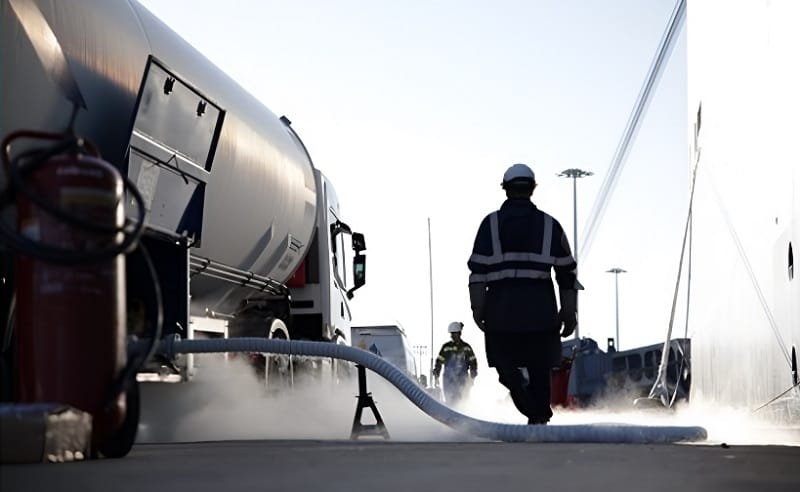United European Car Carriers (UECC), a leading provider of sustainable shortsea transportation services for cars and other rolling cargo in Europe, has marked a significant milestone in Spain’s maritime sector with the Country’s first-ever truck-to-ship delivery of liquefied biomethane (LBM). This landmark operation at the Port of Vigo highlights UECC’s commitment to promoting sustainable bunkering solutions and supporting the circular economy.
The operation, carried out in collaboration with green energy developer Naturgy, involved transferring LBM directly from a tanker truck into the fuel tanks of UECC’s LNG battery hybrid Pure Car and Truck Carrier (PCTC), Auto Advance. Naturgy sourced the LBM from a biomethane production plant in Galicia, underlining the local benefits of this innovative fuel supply chain.
Table of Contents
A Groundbreaking Step for Spain
“This is an important step as it is the first time LBM has been delivered by truck to a ship in the whole of Spain. We view Spain as a promising market for biomethane production and so it’s great to get this first delivery over the line,” said Daniel Gent, UECC’s Energy & Sustainability Manager.
This delivery is a key component of UECC’s strategy to diversify its bunker fuel supply pathways for LBM. Traditionally dependent on its Zeebrugge hub, where it has a long-term agreement with Titan Clean Fuels, UECC is actively expanding its small-scale LBM supply network across Europe.
Expanding Sustainable Fuel Networks
The delivery at the Port of Vigo represents the first physical molecule delivery of LBM in Spain, as opposed to a mass-balance approach, demonstrating UECC’s exploration of alternative delivery methods. This aligns with the company’s broader Sail for Change initiative, which facilitates bioLNG bunkering for its dual and multi-fuel LNG vessels. These efforts are directly contributing to reducing Scope 3 emissions for several major automotive manufacturers.
Supporting the Regional Circular Economy
By fostering demand for biomethane, UECC is bolstering renewable energy initiatives led by Naturgy. The company is part of a joint venture with Reganosa and Repsol, aiming to produce 1 terawatt-hour of biomethane annually from agricultural and livestock waste. This project would reduce Galicia’s gas import reliance by 7% and cut CO2 emissions by 500,000 tonnes per year.
“LBM is an excellent fuel with good sustainability criteria,” noted Gent, highlighting its negative carbon intensity on a well-to-wake basis. Each tonne of LBM supplied delivers a 5-tonne CO2e reduction, made possible through carbon capture and renewable feedstock.
Pioneering Compliance with FuelEU Maritime
UECC’s proactive adoption of low-carbon fuels like LBM aligns seamlessly with FuelEU Maritime regulations. By embracing such innovations, UECC is achieving a compliance surplus while also reducing EU Emissions Trading System (ETS) costs and enhancing its Carbon Intensity Indicator (CII) ratings.
“Securing additional sources of renewable fuel contributes to our decarbonisation pathway, which includes not only FEUM compliance but also our long-term strategy to achieve net zero by 2040,” Gent added.
This milestone delivery underscores UECC’s role as a leader in sustainable maritime operations. As the company continues its efforts to decarbonise the shortsea RoRo trade, Gent expressed optimism “We hope the LBM truck delivery in Spain will be the first of many.”
About UECC
United European Car Carriers (UECC) is a leading provider of sustainable shortsea transportation services for cars and other rolling cargo in Europe. With a focus on innovation and sustainability, the company operates a fleet of eco-friendly vessels, including dual-fuel LNG and hybrid battery-powered PCTCs. UECC is committed to achieving net-zero emissions by 2040 while advancing sustainable practices in the shipping industry.
Source United European Car Carriers

